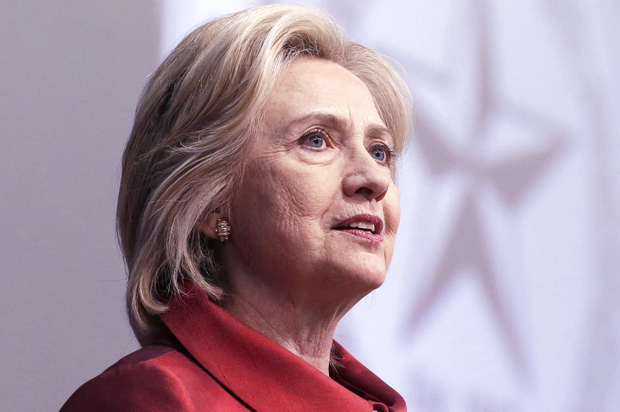In keeping with the general policy thrust of her presidential campaign, which has been more unapologetically liberal than many expected, Hillary Clinton announced on Wednesday that she did not support the Trans-Pacific Partnership, the controversial trade agreement that’s become the focal point of liberal discontent with President Obama. “[B]ased on what I know so far,” Clinton wrote in a statement, “I can’t support this agreement.” It didn’t do enough, she said, to protect American workers.
Clinton’s language was vague and lawyerly enough that there may be less to this opposition than meets the eye: “As of today,” she told PBS, “I am not in favor of what I have learned about it.” But even if her remarks about TPP weren’t as stridently oppositional as some in the press have suggested, the fact that Clinton was opposing the deal at all surprised some journalists — most especially those who recall the years she spent promoting the deal, which she once called the “gold standard,” as secretary of state.
A few journalists weren’t surprised so much as dismayed. “This is such a nakedly political move from Hillary,” tweeted Politico’s Danny Vinik, who argued that the version of the TPP Clinton now opposes is more liberal than the one she’d previously backed. Vox’s Ezra Klein went much longer on a similar theme, writing that Clinton’s new stance made her look “like the kind of candidate who puts polls in front of policy,” which he found to be “unnerving.” It gave credence, he argued, to the idea that Clinton was “unusually poll-tested and calculating, even for a politician.”
From my perspective, however, the strange and unsettling behavior wasn’t coming from Clinton. Sure, I was a little surprised to hear her oppose the deal (at least ostensibly) — but only a little. Clinton is indeed capable of excess cautious and shameless opportunism; and it’s very easy to imagine that her announcement was driven more by fear of Sen. Bernie Sanders than doubts about the TPP’s substance. But that’s just another way of saying she’s a politician who is trying to stay in tune with voters. What’s so disconcerting about that?
If you’re someone who wants your president to be the kind of politician who “tells it like it is” and is too “authentic” to cater their positions to voters’ whims, then I get it. I’d argue that all politicians do these things to one degree or another, and that what matters more than integrity in a president is whether they can get things done. But Clinton truly does struggle more than most politicians when it comes to hiding her motivations. So I can understand how her TPP reversal could lead you to recoil on almost aesthetic grounds.
With regard to Klein and those who share his concerns, though, that’s not the dynamic. These people are hyper-sophisticated when it comes to understanding how politics really functions, both on the campaign trail and behind the scenes. They understand that American government is structured in a way that incentivizes candidates to remain as close as they can to the mushy middle of public opinion. They’re not callow idealists; they understand how this game and system works. And yet this rather ho-hum announcement from Clinton has them clutching their pearls.
I don’t get it, in all honesty. But here’s my best attempt at an explanation. Throughout Klein’s piece, he laments the distance between the Hillary Clinton, the politician and Hillary Clinton, the wonk. Despite being “one of the most serious policy wonks to ever run for president” and having a “sterling” reputation for grasping nearly any issue, Clinton, Klein writes, has a history of being “swayed by polls or interest groups.” Rather than campaigning on a promise to be technocrat-in-chief, in other words, Clinton often does what voters — but not policy experts — think is best.
To Klein, a self-described “wonk” who tends to view politics through a pseudo-academic lens, this concession to raw democracy is a mistake. “[I]t’s not a great way,” he writes, “for Clinton to show she’s willing to make some unpopular decisions if they lead to better policy.” Yet although Klein says that a willingness to go against voters’ desires “has political benefits that don’t show up in narrow issue polls ,” he doesn’t elaborate. The question-begging assumption that a good politician should follow experts instead of voters goes completely unaddressed.
Klein thinks Clinton would be much better off if she got rid of “[p]olitically convenient changes” and sold herself as “an extraordinary policy mind who understands these issues better than her challengers, and so can be trusted to make better decisions on them.” I think that’s pretty terrible advice, quite frankly; campaigning as a know-it-all does not seem to me like a recipe to win. Then again, if you’re inclined to think that policy experts have all the answers, wanting a philosopher-king president makes sense.
But that is decidedly not how most Americans feel. In theory, at least, they’re still committed to democratic self-government. Which means that they want to vote for someone who will listen to them, even if they diverge from the elite consensus. That’s what Clinton is trying to do, however awkwardly. And if Klein finds it so disturbing, he may want to think about whether it’s really Clinton who’s bothering him, or if his problem is with the structure of American governance instead.


